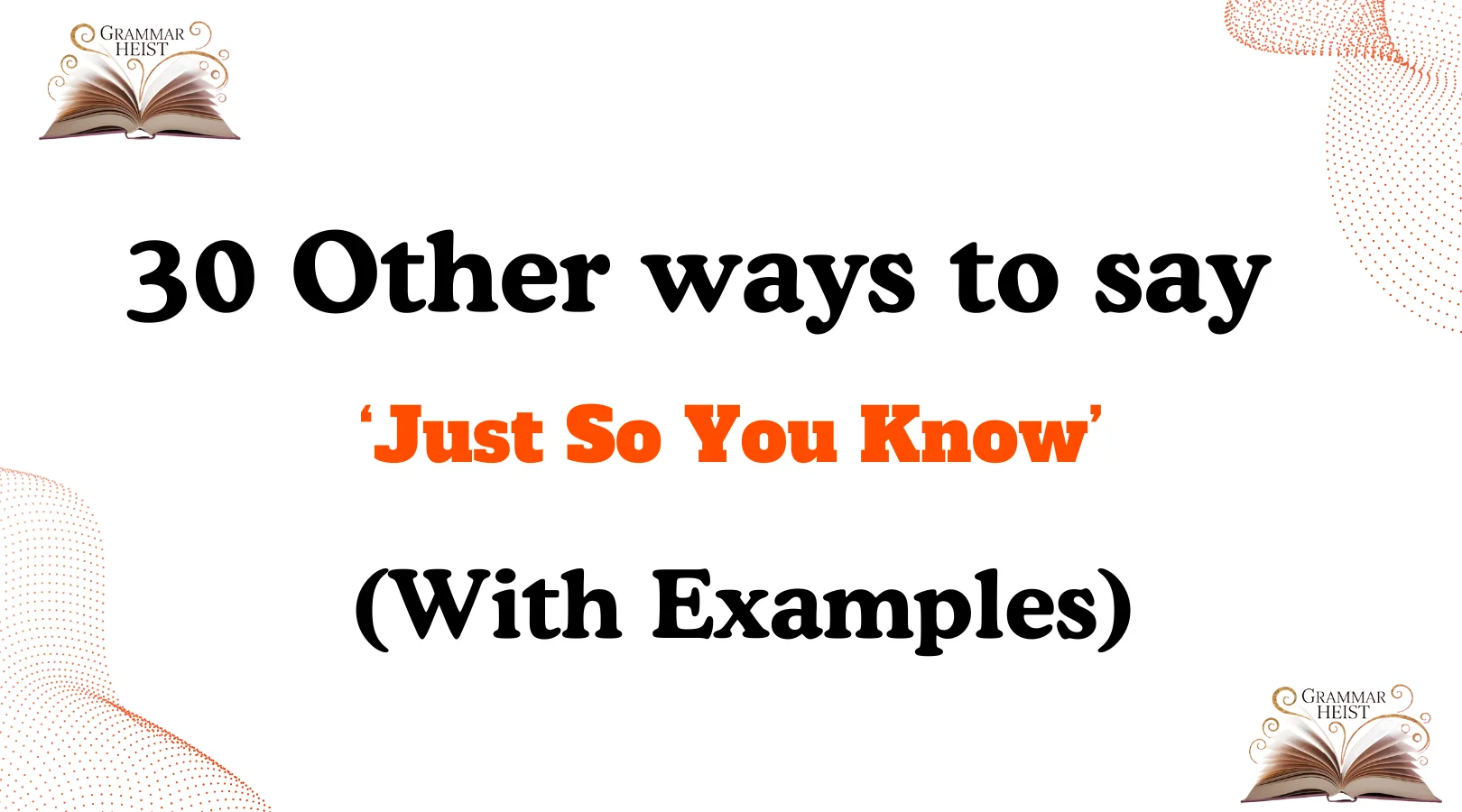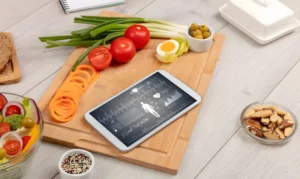Finding the right words to communicate thoughtfully can transform a simple message into one that feels warm, personal, and considerate. “Just so you know” is a commonly used phrase, but there are many ways to convey the same message while adding more empathy and nuance. Whether you’re texting a friend, writing a professional email, or offering information in a compassionate way, the right phrasing can help express care. Here are 30 alternatives that can add a special touch to your communication.
Is It Professional/Polite to Say “Just So You Know”?
Before exploring alternatives, it’s important to reflect on whether “just so you know” is always the best choice in your situation. In some cases, it can sound a little too casual or abrupt, especially in formal settings. However, it’s often used informally among friends, colleagues, or acquaintances. The key is to assess the tone of your message and adapt your language accordingly.
Pros or Cons of Saying “Just So You Know”
Pros
- Quick and easy way to provide information.
- Neutral, can be used in many situations.
- Short and to the point.
Cons
- Can seem a bit abrupt or detached.
- May sound too casual in formal communication.
- Could feel less personal if not properly framed.
Synonyms For Just So You Know
- I Wanted to Make You Aware
- Just a Heads Up
- I Thought You Might Want to Know
- I Just Wanted to Let You Know
- For Your Information (FYI)
- I Thought You Should Know
- In Case You Didn’t Know
- Just to Keep You Updated
- I Wanted to Keep You in the Loop
- I Just Wanted to Bring This to Your Attention
- In Case You’re Interested
- I Just Wanted to Let You Be Aware
- Just Sharing This Information
- I Wanted to Share This With You
- Just Keeping You in the Know
- I Thought It Might Be Useful to Mention
- For Your Awareness
- Something You Might Like to Know
- Just Wanted to Make Sure You Knew
- I Didn’t Want You to Miss This
- Just Bringing This to Your Notice
- I Wanted to Highlight This
- This Might Be Important for You to Know
- Just Wanted to Keep You Posted
- Just in Case It’s Helpful
- I Came Across This and Thought of You
- This Might Be Good to Keep in Mind
- I Wanted to Give You a Quick Update
- I Just Wanted to Mention
- I Hope This Information Helps
1. “I Wanted to Make You Aware”
Scenario: You want to bring attention to something important without sounding too formal.
Examples:
- I wanted to make you aware that the meeting has been rescheduled to 3 p.m.
- I wanted to make you aware that we are still waiting on approval from the client.
- I wanted to make you aware of the potential delays in delivery.
Tone: Professional, considerate
Explanation: This is a great alternative when you want to sound more intentional, offering the same information without being too blunt. It conveys care and responsibility.
2. “Just a Heads Up”
Scenario: You’re giving someone a casual warning or sharing important info.
Examples:
- Just a heads up, we’ll need to finish the report by tomorrow.
- Just a heads up, the office will be closed next Friday.
- Just a heads up, your meeting has been moved to a different location.
Tone: Friendly, approachable
Explanation: This phrase is often used in informal settings, adding a conversational tone to your message. It’s perfect when you want to keep things light but still informative.
3. “I Thought You Might Want to Know”
Scenario: You’re sharing information that might be of interest or importance.
Examples:
- I thought you might want to know that the presentation has been updated.
- I thought you might want to know that I received your package.
- I thought you might want to know that the weather might impact the event schedule.
Tone: Thoughtful, gentle
Explanation: This alternative is a caring way of offering information. It suggests that you’re mindful of the other person’s interests or needs.
4. “I Just Wanted to Let You Know”
Scenario: You’re informing someone about something they may not be aware of.
Examples:
- I just wanted to let you know that your request has been processed.
- I just wanted to let you know that we received your inquiry.
- I just wanted to let you know that the event has been postponed.
Tone: Warm, friendly
Explanation: This phrase is straightforward but soft. It’s polite and helps keep the conversation clear and easygoing.
5. “For Your Information (FYI)”
Scenario: You want to share a piece of information that might be helpful but isn’t urgent.
Examples:
- For your information, the deadline for submissions has been extended.
- For your information, the new policy is available on the website.
- For your information, the store closes at 6 p.m. tonight.
Tone: Neutral, informative
Explanation: A commonly used business phrase, “FYI” is direct but not overly formal. It’s ideal when you need to share facts without adding extra emotion.
6. “I Thought You Should Know”
Scenario: You want to highlight important details for someone’s awareness.
Examples:
- I thought you should know that the team meeting is now virtual.
- I thought you should know that your order has shipped.
- I thought you should know that there will be road closures tomorrow.
Tone: Caring, informative
Explanation: This phrase is gentle and conveys a sense of responsibility, as if you’re looking out for the other person’s best interests.
7. “In Case You Didn’t Know”
Scenario: You’re informing someone of something that may be common knowledge or overlooked.
Examples:
- In case you didn’t know, the store is offering a 20% discount this weekend.
- In case you didn’t know, the system will be down for maintenance this evening.
- In case you didn’t know, your colleague is on leave next week.
Tone: Light, non-judgmental
Explanation: This phrase is a casual way of offering information without sounding patronizing. It’s helpful and friendly, particularly for quick, non-urgent messages.
8. “Just to Keep You Updated”
Scenario: You’re offering the latest news or changes about a project or event.
Examples:
- Just to keep you updated, the client has approved the proposal.
- Just to keep you updated, the weather forecast looks better for tomorrow.
- Just to keep you updated, there’s been a delay in shipping.
Tone: Professional, informative
Explanation: Ideal for ongoing projects, this alternative emphasizes that you’re keeping the recipient in the loop. It shows consideration for their need to stay informed.
9. “I Wanted to Keep You in the Loop”
Scenario: You’re sharing information as part of a larger update or ongoing communication.
Examples:
- I wanted to keep you in the loop about the project’s progress.
- I wanted to keep you in the loop about the upcoming meeting schedule.
- I wanted to keep you in the loop regarding the recent changes.
Tone: Collaborative, inclusive
Explanation: This phrase signals that you value the other person’s involvement and want to make sure they’re informed, particularly in team settings.
10. “I Just Wanted to Bring This to Your Attention”
Scenario: You need to highlight something important or time-sensitive.
Examples:
- I just wanted to bring this to your attention: the payment deadline is approaching.
- I just wanted to bring this to your attention: we need your approval before proceeding.
- I just wanted to bring this to your attention: the meeting has been rescheduled to next Monday.
Tone: Respectful, professional
Explanation: This is a great alternative for more formal communication, showing care while prioritizing the importance of the message.
11. “In Case You’re Interested”
Scenario: You’re providing information that the recipient might find useful or intriguing. Examples:
- In case you’re interested, I’ve attached the report for your review.
- In case you’re interested, here’s the link to the event registration.
- In case you’re interested, I’ve included a few resources on the topic.
Tone: Light, casual
Explanation: This phrase works well when you want to offer information but leave the decision to the recipient whether to act on it. It’s informal and thoughtful.
12. “I Just Wanted to Let You Be Aware”
Scenario: You need to communicate information that might affect someone’s decision-making.
Examples:
- I just wanted to let you be aware that the event location has changed.
- I just wanted to let you be aware that the new version of the app is available.
- I just wanted to let you be aware that the promotion ends at midnight.
Tone: Soft, thoughtful
Explanation: This phrase is a warm and polite way of making someone aware of important updates without sounding harsh or too forward.
13. “Just Sharing This Information”
Scenario: You want to casually pass along information, keeping the tone light.
Examples:
- Just sharing this information, the meeting will be at 10 a.m. tomorrow.
- Just sharing this information, the concert tickets go on sale tomorrow.
- Just sharing this information, the office is closed for the holiday.
Tone: Casual, relaxed
Explanation: This phrasing is easygoing and can be used when the information doesn’t need to be treated as urgent or too important.
14. “I Wanted to Share This With You”
Scenario: You have information that you think might be helpful or relevant to the other person.
Examples:
- I wanted to share this with you—the company just released its quarterly report.
- I wanted to share this with you in case you’re still looking for event venues.
- I wanted to share this with you because I know you’re interested in this topic.
Tone: Warm, considerate
Explanation: This phrase emphasizes sharing rather than informing, making it feel more personal and engaging.
15. “Just Keeping You in the Know”
Scenario: You want to ensure someone stays updated on a situation.
Examples:
- Just keeping you in the know, the project deadline has been extended.
- Just keeping you in the know, our team is finalizing the final draft.
- Just keeping you in the know, we received confirmation from the client.
Tone: Friendly, conversational
Explanation: This phrase adds a casual yet informative touch, making it suitable for updates among colleagues or friends.
16. “I Thought It Might Be Useful to Mention”
Scenario: You want to highlight something that could be helpful.
Examples:
- I thought it might be useful to mention that the policy has changed.
- I thought it might be useful to mention that parking will be limited.
- I thought it might be useful to mention that the software update fixes the bug.
Tone: Helpful, neutral
Explanation: This phrase makes it clear you’re offering useful information without assuming the person already knows.
17. “For Your Awareness”
Scenario: You’re providing information that someone should be aware of, especially in a work setting.
Examples:
- For your awareness, there’s a system update happening overnight.
- For your awareness, the contract has been revised.
- For your awareness, the new office policy starts next week.
Tone: Professional, informative
Explanation: This phrase is direct and businesslike, making it ideal for emails or formal discussions.
18. “Something You Might Like to Know”
Scenario: You’re sharing something interesting or relevant to the other person.
Examples:
- Something you might like to know—the cafe down the street just launched a new menu.
- Something you might like to know, the concert tickets go on sale today.
- Something you might like to know, we just received early access to the software.
Tone: Engaging, friendly
Explanation: This phrase adds a lighthearted touch, making it great for personal or informal communication.
19. “Just Wanted to Make Sure You Knew”
Scenario: You’re ensuring that someone is informed.
Examples:
- Just wanted to make sure you knew that the meeting time has changed.
- Just wanted to make sure you knew that your appointment is tomorrow.
- Just wanted to make sure you knew that the store is closing early today.
Tone: Thoughtful, caring
Explanation: This phrase conveys concern and responsibility, ensuring the recipient is aware of important details.
20. “I Didn’t Want You to Miss This”
Scenario: You’re highlighting something valuable or exciting.
Examples:
- I didn’t want you to miss this—there’s a limited-time offer on that product you liked.
- I didn’t want you to miss this, so I’m forwarding the invitation to you.
- I didn’t want you to miss this, the deadline for applications is approaching.
Tone: Enthusiastic, encouraging
Explanation: This phrase adds a sense of urgency and care, making the message feel more personal.
21. “Just Bringing This to Your Notice”
Scenario: You’re pointing out something important.
Examples:
- Just bringing this to your notice, the system may be down tomorrow for maintenance.
- Just bringing this to your notice, the parking rules have changed.
- Just bringing this to your notice, we received an update from the client.
Tone: Professional, neutral
Explanation: This phrase is formal but not too rigid, making it suitable for work-related conversations.
22. “I Wanted to Highlight This”
Scenario: You need to emphasize a key detail.
Examples:
- I wanted to highlight this so you don’t miss the important details.
- I wanted to highlight this—our budget is running low for this quarter.
- I wanted to highlight this, the application deadline is in two days.
Tone: Focused, clear
Explanation: This phrase draws attention to something significant without sounding abrupt.
23. “This Might Be Important for You to Know”
Scenario: You’re sharing something that might affect the recipient.
Examples:
- This might be important for you to know, the contract expires next week.
- This might be important for you to know, there’s an update on the travel policy.
- This might be important for you to know, your subscription renews automatically.
Tone: Supportive, informative
Explanation: This phrase makes it clear that you’re considering the recipient’s needs.
24. “Just Wanted to Keep You Posted”
Scenario: You’re updating someone on an ongoing matter.
Examples:
- Just wanted to keep you posted, we are waiting for final approval.
- Just wanted to keep you posted, there’s been a change in the itinerary.
- Just wanted to keep you posted, the team is working on the final draft.
Tone: Friendly, inclusive
Explanation: This phrase keeps the conversation open and welcomes further discussion.
25. “Just in Case It’s Helpful”
Scenario: You’re offering information that may be useful.
Examples:
- Just in case it’s helpful, here’s the link to the document.
- Just in case it’s helpful, I attached some additional resources.
- Just in case it’s helpful, the application deadline was extended.
Tone: Considerate, gentle
Explanation: This phrase makes the information feel optional rather than intrusive.
26. “I Came Across This and Thought of You”
Scenario: You’re sharing something that reminded you of the recipient.
Examples:
- I came across this and thought of you—it’s an article about your favorite author.
- I came across this and thought of you, since you were looking for new job opportunities.
- I came across this and thought of you, it’s a great deal on flights to Europe!
Tone: Personal, thoughtful
Explanation: This phrase adds a touch of warmth and connection.
27. “This Might Be Good to Keep in Mind”
Scenario: You’re giving someone a helpful tip or reminder.
Examples:
- This might be good to keep in mind, the roads will be busy this weekend.
- This might be good to keep in mind, the deadline is approaching.
- This might be good to keep in mind, your subscription will renew automatically.
Tone: Soft, guiding
Explanation: This phrase gently suggests awareness without pressuring the recipient.
28. “I Wanted to Give You a Quick Update”
Scenario: You’re providing a brief status update.
Examples:
- I wanted to give you a quick update, the project is on track for completion.
- I wanted to give you a quick update, our meeting has been rescheduled.
- I wanted to give you a quick update, I’ll be available after 3 p.m.
Tone: Clear, professional
Explanation: This phrase signals brevity and efficiency.
29. “I Just Wanted to Mention”
Scenario: You’re casually bringing something up.
Examples:
- I just wanted to mention, there’s a great sale happening now.
- I just wanted to mention, we’re finalizing the schedule soon.
- I just wanted to mention, I’ll be out of town next week.
Tone: Light, conversational
Explanation: This phrase keeps the conversation informal.
30. “I Hope This Information Helps”
Scenario: You’re offering information in a caring way.
Examples:
- I hope this information helps, let me know if you need more details.
- I hope this information helps, feel free to reach out with questions.
- I hope this information helps, I’ll keep you posted with updates.
Tone: Supportive, warm
Explanation: This phrase adds a sense of care and willingness to help.
Conclusion
Finding the right words can transform the way your message is received. Instead of using “just so you know,” these alternatives help you convey care, warmth, and professionalism depending on the situation. Whether you’re sharing an update, offering a reminder, or providing helpful information, choosing the right phrase makes your communication more thoughtful and engaging.
By using these alternatives, you can express yourself in a way that resonates with others, making your messages feel more considerate and intentional. Next time you need to share information, try one of these meaningful and impactful phrases!

Emma Brooke is a passionate advocate for effective communication and language mastery. As a dedicated professional in the field of grammar and writing, Emma brings a wealth of knowledge and expertise to those seeking to improve their linguistic skills. With a focus on clarity, precision, and style, Emma Brooke is committed to helping individuals refine their language use to communicate confidently and effectively.












